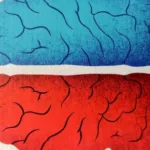
Can you imagine living being sure that you are dead or, on the contrary, believing that you are immortal? What do you think you would think if you were one hundred percent sure that your organs had stopped working? Seems crazy, right? Well, it is not so much for those people who suffer from Cotard syndrome. They come to feel that everything around them is not true, having the certainty within them that they are truly dead.
At PsychologyFor we want to introduce you to this rare and unknown disorder which affects 1% of the world’s population and about which so little is known. In this article you will find what is the Cotard syndrome, its symptoms, causes and treatment.
What is Cotard syndrome in psychology
He Cotard syndrome It is known by specialists as delusion of denial or non-existence. Patients tend to deny everything that surrounds them, even going so far as to deny both their own existence and that of the world itself.
It was Jules Cotard in 1880 who first described a case with these characteristics. This neurologist had to treat a woman who claimed that she did not have various parts of her body and that, because of this, she was immortal, since she could not die by natural death.
Depending on the intensity of the syndrome, the level of denial on the part of the patient will have different values and interpretations on their part. This can appear in the patient either partially or completely, later we will see the wide spectrum of which it is composed.
Cotard syndrome: symptoms
The symptomatological presentation of said syndrome is very variable, as indicated by Muñoz (2009). Well, the degree of severity in which it can be expressed differs in each of the patients.
As fundamental symptom of Cotard syndrome We find the delusion of denial, this can simply go from the belief of intellectual losses by the patient, until denial of your own existence passing through the conviction that his organs are dying or, on the contrary, that he does not have any organs.
As Muñoz (2009) pointed out, it has been seen that the disease appears suddenly, that is, it is not related to having a specific previous psychiatric condition, but it has been seen that its onset is associated with a phase of anxiety and irritability. Furthermore, if the syndrome has intermediate severity, patients usually express, on the one hand, depressive feelings and, on the other, the feeling of losing their reasoning abilities.
When it is a complete delirium, the patient has a level of denial of reality that can even make you wish you didn’t exist. Usually, complete Cotard syndrome begins with the patient’s denial of a part of the body, characterized by other vital organs.
On the other hand, we find what are known as accessory symptoms, the most frequent being analgesia (inability to feel pain), mutism (voluntary silence on the part of the patient), self-mutilation, suicidal ideas, and even hallucinations.
Cotard syndrome: causes
What are the causes of Cotard syndrome? After studying multiple Real cases practical studies such as those carried out by Berrios (1995), it was possible to observe how those people affected by Cotard syndrome tended to have certain manic-depressive conditions. These ailments tend to result either in internalized attribution styles where the person considers that the cause of his problems is himself and that therefore he has no way to solve it, or also in a depersonalization associated, the patient believing that he is separated from his own body, that he is only a mere spectator of his life.
However, according to authors such as Ramirez (2010), the existence of a neurological problem can lead to the development of Cotard syndrome. Some of the diseases that could be evocative of this syndrome are: Parkinson’s, recurrent migraines, brain tumors, traumatic brain injuries and multiple sclerosis.
Cotard syndrome: treatment
He Cotard syndrome treatment It depends both on the level of severity and the causes that have given rise to its appearance. However, all treatments have one point in common: a specialist must evaluate and dictate the appropriate treatment for each patient.
In those cases where patients have affective disorders, the use of antidepressants is recommended as their effectiveness has been proven in various studies, such as the one carried out by Huarcaya (2018). However, it must be pointed out that, in some cases where the affective symptoms are produced intensely, the use of mood stabilizers.
Although the syndrome has been evoked underlyingly by an organic entity, the most effective treatment will be that which is intended to counteract the condition that has caused it. For example, if the patient has Parkinson’s disease and this has given rise to Cotard syndrome, the appropriate pharmacology is that which will combat the symptoms of Parkinson’s.
It has also been proven that, despite the worse prognosis that this disease has when it is associated with a chronic schizophrenic illness. In these cases, the use of antipsychotic medication can achieve a good response from the patient.
Due to the severity to which this syndrome can result, that is, the possibility of the patient self-harming, it is not surprising that the professional who evaluates the patient recommend temporary hospitalization in order to, in this way, be able avoid self-harming behavior at the same time that a close observation of their behavior is carried out.
This article is merely informative, at PsychologyFor we do not have the power to make a diagnosis or recommend a treatment. We invite you to go to a psychologist to treat your particular case.
If you want to read more articles similar to Cotard syndrome: symptoms, causes and treatment we recommend that you enter our Clinical Psychology category.
Bibliography
- Berrios, GE, & Luque, R. (1995). Cotard’s syndrome: analysis of 100 cases. Acta Psychiatrica Scandinavica, 91(3), 185-188.
- EL PAÍS, SDAE PSYCHIATRIC SYNDROMES. SYNDROMES528
- Huarcaya-Victoria, J., & Podesta-Ampuero, A. (2018). Cotard syndrome, catatonia and depression: case report. Journal of Neuro-Psychiatry, 81(2), 135-140.
- Muñoz, EC, & Alzate, BG (2009). Cotard syndrome: presentation of a case. Colombian Journal of Psychiatry, 38(1), 194-202.
- Ramirez-Bermudez, J., Aguilar-Venegas, LC, Crail-Melendez, D., Espinola-Nadurille, M., Nente, F., & Mendez, MF (2010). Cotard syndrome in neurological and psychiatric patients. The Journal of neuropsychiatry and clinical neurosciences, 22(4), 409-416








